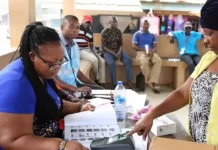
West Africa, with about 380 million people, is the final frontier for global automakers looking to increase manufacturing capacity in a region where they currently have little presence.
While local assemblers in Nigeria, home to nearly half of the region’s population, have partnered with companies such as Volkswagen AG to make vehicles in the country, President Muhammadu Buhari last year rejected a bill that would give carmakers a 10-year tax holiday, dealing a blow to their efforts to expand manufacturing capabilities there.
Now, smaller neighbors like Ghana are stepping up to the plate.
The country approved its own auto policy last year, offering tax breaks to carmakers and promising to restrict second-hand cars, which account for 70% of vehicle imports in a country with barely any local manufacturing. Within months, parliament banned imports of cars that are more than 10 years in a bid to lure the likes of Volkswagen, Nissan, Toyota and Renault.
On Aug. 3, Ghana became the fifth location on the continent where VW cars are assembled, even though the bulk of the work – at the initial stage, at least – will be done by a local partner that’s the German carmaker’s main dealer in the nation of 30 million people.
Volkswagen provided training to the staff of the Accra-based Universal Motors Ltd.’s assembly plant through video conferencing after the pandemic forced borders shut. But Covid-19 has only worsened another roadblock for consumers: affordability.
People have embraced second-hand cars, coming up with nicknames for the most common brands, because new ones are too expensive and auto-financing is scarce.
In Ghana, less than 5% of cars are financed by banks, according to the Ghana Automobile Dealers Association. Until that’s addressed, the auto policy’s success will remain in question.
The Herald


























